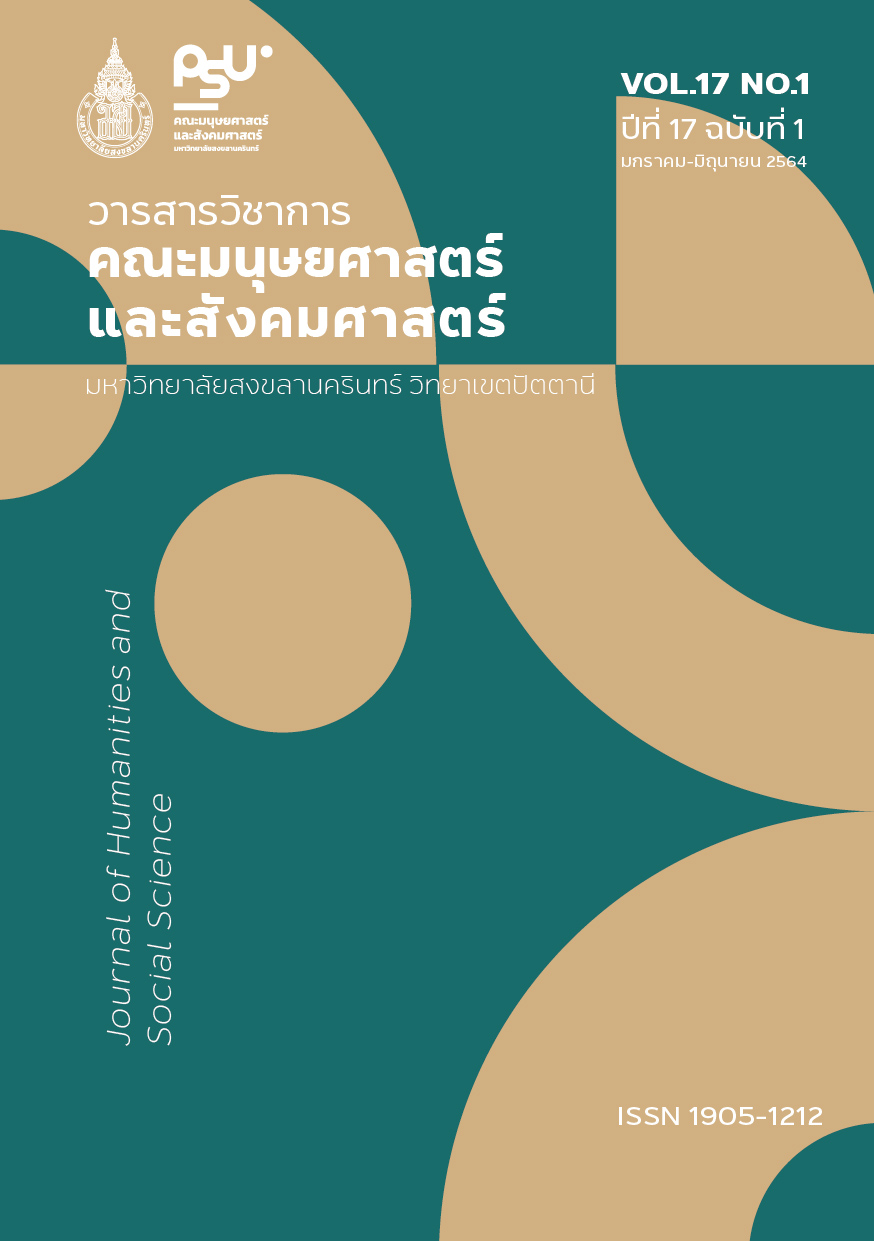The Change of Political Identity of Taiwan and the Relationship with Thailand in the Social and Cultural Dimension
Keywords:
Taiwan, Political Identity, International Relations, Social and Cultural Dimension, ConstructivismAbstract
The objective of this research is to study the change of political identity and interests of Taiwan that affect the relationship between Taiwan and Thailand in the social and cultural dimension from the Constructivist theory. This research uses qualitative research by using documentary research and in-depth interview with 4 Thai and Taiwanese scholars and 2 high-ranking officials of Taipei Economic & Cultural Office in Thailand. The data are analyzed by using descriptive analysis. The results and the suggestion are summarized as follows:
Taiwan’s democratization has begun in the 1980s which has defined the new meaning of Taiwanese national identity and interests. This change has been consistent with the norms of international politics during the end of the cold war that liberal democracy is universal value. According to Constructivism, the new constructed national identity of Taiwan aims to determine forms of relations that are different from ones in the past. The rise of Taiwanese democratic political system identity has propelled its foreign policy to extend cooperation with other various countries. Especially, the New Southbound Policy has emphasized more people –to –people cooperation that advances the relationship between Taiwan and Thailand in education and tourism, including the cooperation among International Non-Governmental Organizations and Non-Governmental Organizations of both countries. The research suggests that Thai government, Thai private companies, as well as Thai civil society organizations should seek more cooperation in several aspects such as education, medicine, and technology with Taiwan which has advanced competencies and capabilities more than Thailand.
References
โกวิท วงศ์สุรวัฒน์. (2560, 21 มิถุนายน). เรื่องของความเป็นรัฐ (state) ของไต้หวัน. มติชน, น. 6.
ทักษิณา ข่ายแก้ว. (30 เมษายน 2561). จับตานัยทางการเมือง กรณีจีนค้าน 'ไต้หวัน' ร่วมประชุมองค์การอนามัยโลก. สืบค้นเมื่อ 8 พฤษภาคม 2562, จาก https://www.voathai.com/a/taiwan-china-who-tk/4370357.html
รัศมี กฤษณมิษ. ไช่ชิวหลิง, สวี่เหวินเยี่ยน, จี้ฮุ่ยไช, อูฮุ่ยลี่, บังอร แซ่เผิง, วัชราภรณ์ ทิพย์ธวัชวงศา, ดรรชนี สุระเทพ, บุษรา สมบัติ. (ม.ป.ป.). ครบรอบ 20 ปี มูลนิธิพุทธฉือจี้ไต้หวันในประเทศไทย. กรุงเทพฯ : มูลนิธิพุทธฉือจี้ไต้หวันในประเทศไทย. สืบค้นเมื่อ 24 กรกฎาคม 2562, จาก https://www.tzuchithailand.org/th/images/publication/20_year_anniversary/
มูลนิธิพุทธฉือจี้ไต้หวันในประเทศไทย. (ม.ป.ป.) ปฐมบท ฉือจี้ในประเทศไทย. สืบค้นเมื่อ 24 กรกฎาคม 2562, จาก https://www.tzuchithailand.org/th/index.php/about-us/tzu-chi-foundation-in-thailand/our-tzuchi-thailand
วิเชียร อินทะสี. (2546). นโยบายการรวมประเทศของจีนและไต้หวัน (รายงานผลการวิจัย). ปทุมธานี: สถาบันเอเชียตะวันออกศึกษา มหาวิทยาลัยธรรมศาสตร์.
สิทธิพล เครือรัฐติกาล และวรศักดิ์ มหัทธโนบล. (2558). ไต้หวันในความสัมพันธ์ระหว่างประเทศ. กรุงเทพฯ : โรงพิมพ์แห่งจุฬาลงกรณ์มหาวิทยาลัย.
สุนทร ลีวงศ์เจริญ. (2528). ปัญหาไต้หวันกับความสัมพันธ์ระหว่างสหรัฐอเมริกาและสาธารณรัฐประชาชนจีน. (สารนิพนธ์มหาบัณฑิต มหาวิทยาลัยธรรมศาสตร์, กรุงเทพฯ). สืบค้นจาก http://digi.library.tu.ac.th/thesis/po/1122/]
สำนักงานการค้าและเศรษฐกิจไทย (ไทเป). (ม.ป.ป.). ประวัติองค์กร. สืบค้นเมื่อ 7 กรกฎาคม 2562, จาก http://www.tteo.org.tw/main/th/organize/55291-ประวัติองค์กร.html
สำนักงานเศรษฐกิจและวัฒนธรรมไทเป ประจำประเทศไทย. (2559, 16 มิถุนายน). ความสัมพันธ์ระหว่างสำนักงานฯ กับไทย. สืบค้นเมื่อ 7 กรกฎาคม 2562, จาก https://www.roc-taiwan.org/th_th/post/59.html
สำนักงานเศรษฐกิจและวัฒนธรรมไทเป ประจำประเทศไทย. (2019, กันยายน). ไทย-ไต้หวันก้าวไกลไปกับนโยบายมุ่งใต้ใหม่. กรุงเทพฯ: สำนักงานเศรษฐกิจและวัฒนธรรมไทเป ประจำประเทศไทย
องอาจ เดชอิทธิรัตน์. (2551). เบื้องลึกเบื้องหลังความสัมพันธ์ไทย-ไต้หวัน ภายใต้นโยบายจีนเดียว (พิมพ์ครั้งที่ 2). กรุงเทพฯ: โรงพิมพ์มหาวิทยาลัยธรรมศาสตร์.
ICDFและ RPF จับมือสู่ความร่วมมือใหม่ กับการสัมมนาไต้หวัน - ไทย ปี 2019 และร่วมลงนามในโครงการความร่วมมือครั้งที่ 4. (2562, 8 พฤศจิกายน). สืบค้นเมื่อ 10 พฤศจิกายน 2562, จาก https://th.taiwantoday.tw/news.php?unit=469&post=165696&unitname
Adler, E. (2012). Constructivism in international relations: Sources, contributions, and debates. In W. Carlsnaes, T. Risse, & B. A. Simmons (Eds.), Handbook of International Relations (pp. 112-144). Los Angeles: SAGE.
Aspinwall, N. (2019, September 26). Taiwan loses 2 diplomatic allies, wins US support ahead of crucial presidential election. Retrieved November 7, 2019, from https://thediplomat.com/2019/09/taiwan-loses-2-diplomatic-allies-wins-us-support-ahead-of-crucial-presidential-election/
Bedford, O. & Hwang, K.-K. (2006). Taiwanese identity and democracy: The social psychology of Taiwan’s 2004 elections. New York: Palgrave Macmillan.
Chase, M. S. (2007). Explaining Taiwan’s Response to Chinese Military Modernization: Alliance Dynamics, Threat Perceptions, and Domestic Politics. (Doctoral dissertation). Available from ProQuest Dissertations and Theses database. (UMI No. 3288570)
Chen, C,-K. (2013). Cross-Strait Economic Ties: Taiwan’s Domestic Politics, and China-Taiwan Relations, 1990 – 2008. (Doctoral dissertation). Available from ProQuest Dissertations and Theses database. (UMI No. 3622773)
Chen, Y. W. (2012). ECFA and Beyond: The Paradigm Shift of Taiwan’s National Defense Policy. In P. C. Y. Chow. (Ed.) National Identity and Economic Interest: Taiwan’s CompetingOoptions and Their Implications for Regional Stability. (pp. 205-231). New York: Palgrave Macmillan.
Clark, I. (2011). Democracy in International Society: Promotion or Exclusion?. In J. Hoover, M. Sabaratnam, & L. Schouenborg (Eds.), Interrogating Democracy in World Politics. (pp. 32-45). New York: Routledge.
Davison, G. M. (2003). A short history of Taiwan: the case for independence. Westport, Connecticut: Praeger.
Friedman, E. (Ed.). (2006). China’s rise, Taiwan’s dilemmas and international peace. New York: Routledge.
Hobson, C. (2011). Escaping the liberal straitjacket: Re-examining democracy’s history. In J. Hoover, M. Sabaratnam, & L. Schouenborg (Eds.), Interrogating Democracy in World Politics. (pp. 66- 81). New York: Routledge.
Horowitz, S., Heo, U, & Tan, A. C. Tan. (2007). Democratization and national identity in the China-Taiwan and Korean conflicts. In S. Horowitz, U. Heo, & A. C. Tan (Eds.) Identity and change in East Asian Conflicts: The case of China, Taiwan, and the Koreas. (pp. 1-26). New York: PALGRAVE MACMILLIAN.
Huang, C.-H., & James, P. (2014). Blue, green or aquamarine? Taiwan and the status quo preference. The China Quarterly, 219, 670-692. doi.org/10.1017/S0305741014000745.
Huang, C. (2015, November 8). Xi-Ma summit remains more symbolism than substance. Retrieved from https://www.scmp.com/news/article/1876566/xi-ma-summit-remains-more-symbolism-substance
Hughes, C. R. (2016). National identity. In G. Schubert (Ed.), Routledge Handbook of Contemporary Taiwan. (pp. 153-168). New York: Routledge.
Jie, D. (2012). The Rise and Fall of the Taiwan Independence Policy: Power Shift, Domestic Constraints, and Sovereignty Assertiveness (1988-2010). (Doctoral dissertation). Available from ProQuest Dissertations and Theses database. (UMI No. 3542901)
Liu, J. C.-N. (2004). From Chinese National Identity to Taiwanese Consciousness: An Examination of the Cultural Elements in Taiwan’s Democratization during the Lee Teng-hui Era and Its Legacy, 1988-2004. (Unpublished doctoral dissertation). Bond University, Australia.
Kantasingh, K. C. (2012). A Fruitful Future for the United States and China: Altering the United States-Taiwan Relationship. (Master thesis). Available from ProQuest Dissertations and Theses database. (UMI No. 1537156)
Kegley, C. W., Jr. & Blanton, S. L. (2013). World politics: trend and transformation. Massachusetts: Wadsworth, Cengage Learning.
Kuntić, D. (2015). The Ominous Triangle: China-Taiwan-the United States relationship. Croatian International Relations Review/CIRR, XXI, 239-280. doi:10.1515/cirr-2015-0008
Li, Y. (2014). Constructing Peace in the Taiwan Strait: a constructivist analysis of the changing dynamics of identities and nationalisms. Journal of Contemporary China, 23, 119-142. doi:10.1080/10670564.2013.809985
Melgoza, D. M. (2013). Taiwan & China: The Unspoken Conflict in The 21st Century. (Master thesis). Available from ProQuest Dissertations and Theses database. (UMI No. 10305833)
Muyard, F. (2012). Taiwanese National Identity, Cross-Strait Economic Interaction, and the Integration Paradigm. In P. C. Y. Chow. (Ed.) National Identity and Economic Interest: Taiwan’s Competing Options and Their Implications for Regional Stability. (pp. 153-186). New York: Palgrave Macmillan.
Ngeow, C. B. (2017). Taiwan’s Go South Policy: Deja vu All Over Again?. Contemporary Southeast Asia, 39(1), 96-126. doi:10.1355/cs39-lc.
Waltz, K. (1979). Theory of international politics. Massachusetts: Addison-Wesley Publishing Company.
Wei, C.-Y. (2017). Taiwan’s cultural diplomacy and cultural policy: A case study focusing on performing arts (1990-2014). (Unpublished doctoral dissertation). University of London, England.
Wendt, A. (1992, Spring). Anarchy is what states make of it: The social construction of power politics. International Organization, 46(2), 391-425.
Winkler, S. (2011, November 17). Biding Time: The Challenge of Taiwan’s International Status. Retrieved April 22, 2018, from https://www.brookings.edu/research/biding-time-the-challenge-of-taiwans-international-status/
Zehfuss, M. (2002). Constructivism in international relations the politics of reality. Cambridge: Cambridge University Press.
การสัมภาษณ์
Chang, Boris C.K. Acting Director Political Division, Taipei Economic & Cultural Office in Thailand. (2019, November 22). Interview.
Chen, Shangmao. Professor of Department of Public Affairs and Director of Southbound Policy Office, Fo Guang University, Taiwan. (2019, November 17). Interview.
Hsu, Jason. Director of Economic Division. Taipei Economic & Cultural Office in Thailand. (2019, November 18). Interview.
พิทยา สุวคันธ์. รองศาสตราจารย์ ดร. ประจำวิทยาลัยสหวิทยาการ มหาวิทยาลัยธรรมศาสตร์. (22 พฤศจิกายน 2562). สัมภาษณ์.
วรศักดิ์ มหัทธโนบล. รองศาสตราจารย์ ประจำคณะรัฐศาสตร์ และผู้อำนวยการศูนย์จีนศึกษา จุฬาลงกรณ์มหาวิทยาลัย. (22 พฤศจิกายน 2562). สัมภาษณ์.
สิทธิพล เครือรัฐติกาล. รองศาสตราจารย์ ดร. ประจำวิทยาลัยสหวิทยาการ และผู้อำนวยการสถาบันเอเชียตะวันออกศึกษา มหาวิทยาลัยธรรมศาสตร์. (19 พฤศจิกายน 2562). สัมภาษณ์.
Downloads
Published
How to Cite
Issue
Section
License
Copyright (c) 2021 Journal of Humanities and Social Sciences

This work is licensed under a Creative Commons Attribution-NonCommercial-NoDerivatives 4.0 International License.
บทความนี้ได้รับการตีพิมพ์เป็นของวารสารวิชาการคณะมนุษยศาสตร์และสังคมศาสตร์ คณะมนุษยศาสตร์และสังคมศาสตร์ มหาวิทยาลัยสงขลานครินทร์ วิทยาเขตปัตตานี






